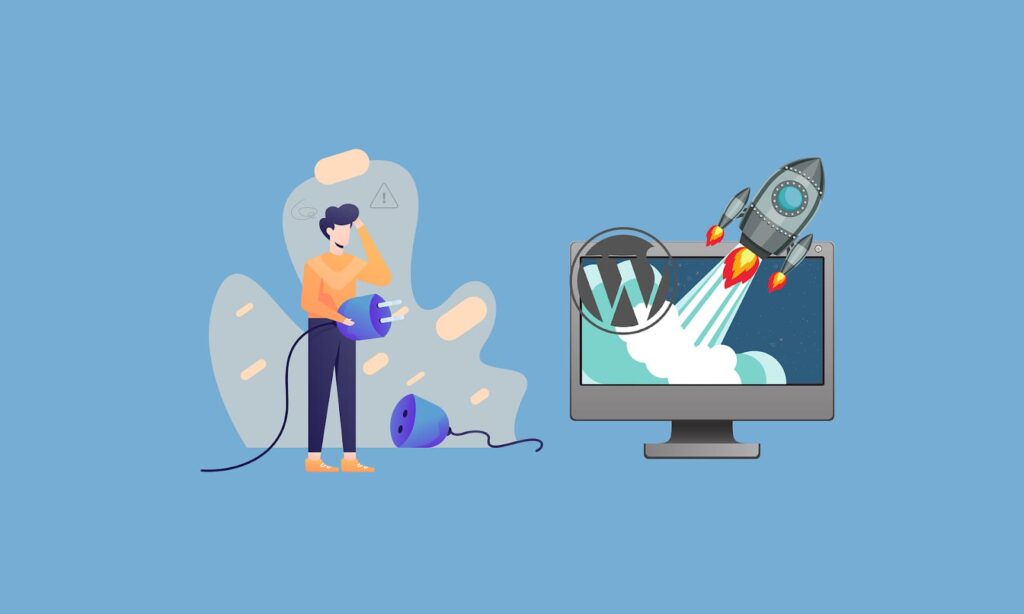
Typical Challenges in Building a WordPress Website and How to Resolve Them
If you were to ask a small business owner which content management system (CMS) comes to their mind first, chances are they would say “WordPress.” The popularity of this platform is well-deserved thanks to its flexibility, versatility, and a vast collection of themes and plugins.
Installing the system and creating a basic website using WordPress does not necessarily require the expertise of a professional WordPress development company.
Read the post ‘What Is a WordPress Development Company‘ to learn about the roles and responsibilities of professional WordPress developers, as well as the benefits they can bring to your business.
However, as the site becomes more complex and additional third-party add-ons are implemented, it may start exhibiting various quirks.
While it’s true that certain concerns do necessitate the input of professionals, not every issue actually calls for expert help. In many situations, WordPress users can attempt to address these problems themselves.
In this article, we will explore common challenges that often arise during WordPress website development and system usage, ranging from incorrect admin credentials to data corruption. We will also provide solutions to help resolve these problems. Whether you are a WordPress developer or a regular user, we hope this information proves valuable.
Issues With Building WordPress Websites Related to Data
Issue #1: Database Connection Failure
Imagine a common scenario that most WordPress developers and users have encountered. You’re trying to add a new blog post, but suddenly an error message pops up, stating that the system couldn’t connect to the database. Several WordPress issues can lead to this kind of failure. You can either troubleshoot them yourself or seek assistance.
Incorrect Connection Data
Firstly, ensure that the wp-config.php file contains the correct username, password, hostname, and database name. It’s possible that someone made changes without informing you. Locate the file and verify the data. Is it incorrect? Make the necessary edits. Correct? Then continue investigating for the root cause.
Hosting Provider or Server Problems
Another potential culprit could be your hosting provider. It’s possible that you’ve exceeded the allowed storage limit for your database. Contact your provider to confirm this. Additionally, the server itself might be experiencing technical difficulties. In such cases, time is usually the solution.
Issue #2: Excessive Data
Another significant problem in WordPress website development and usage is the accumulation of unnecessary data in the database. When you initially install WordPress, your database is clean and well-organized.
However, trouble arises as you start adding posts, comments, and other content. The system creates additional tables, such as metadata tables, alongside the primary ones. For example, you may end up with a comments table and its related metadata table.
Over time, as more data accumulates in your database, the structure can become unwieldy due to the numerous interrelations between tables. Querying the data using SQL becomes increasingly difficult. While WordPress provides built-in methods to simplify the table structure, large amounts of data can cause the website to slow down significantly.
Unfortunately, you can’t alter the system’s default behavior. In this case, the best approach is to hire WordPress development experts. They will thoroughly evaluate your database organization and offer optimal strategies to maintain cleanliness and efficiency.
Common Issues Related to WordPress Plugins: Troubleshooting and Solutions

Issue #1: Blank Pages on Your WordPress Site
WordPress continues to improve with each update, but plugins are still essential for enhancing a site’s functionality. With a vast selection of plugins available, WordPress users and developers have plenty of options.
However, this abundance can lead to problems, such as encountering a completely blank page when accessing your WordPress site. Without any notifications or warnings, it can be frustrating to figure out what went wrong.
To address this issue, experienced WordPress developers recommend a simple troubleshooting step. Temporary disabling all plugins can help identify the culprit causing the error. Here’s what you should do:
- Access your site via FTP.
- Locate the plugins directory.
- Rename the directory to something different.
Now, revisit your site. If the content reappears, you’ve found the problematic plugin. Follow these steps to narrow it down further:
- Restore the original name to the plugins directory.
- Cut and paste each plugin folder into a separate folder.
- Move one folder back at a time into the original plugins directory while monitoring the page.
- Once you identify the offending plugin, remove it or replace it with an alternative.
Keep in mind that this issue can occur on any page of your website. Additionally, since PHP is commonly used in WordPress development, a lack of PHP memory can also trigger this problem.
If you suspect a faulty plugin or limited memory, you can enable the debug mode by setting the WB_DEBUG constant to true in the wp-config.php file. This will help you quickly identify the specific error.
Issue #2: Slow Loading Pages
Sometimes, the guilty party behind painfully slow-loading pages on your WordPress site isn’t the plugins you’ve installed. Rather, it could be the sheer number of them. We get it – it’s tempting to use as many plugins as possible to meet your business needs.
However, an excessive amount of add-ons can lead to unpleasant issues with WordPress. One such problem is the abnormally long loading times experienced by your site. If you’ve noticed that your website is running at a speed that was acceptable ten years ago but is now far from ideal, it’s time to review your plugin list.
Ensure that you don’t have any redundant plugins weighing your site down. Consider sticking to one plugin for each essential function, like search engine optimization or data analytics.
Other Challenges That May Arise During WordPress Website Building

Issue #1: Dealing with Parse Error in WordPress
Encountering a parse error in WordPress can be quite annoying, but fortunately, it’s a problem that can be resolved relatively easily. Rather than attempting to reinvent the wheel, even experienced WordPress developers often opt to utilize existing coding solutions, which can sometimes result in errors.
One common cause of this error is a missing slash or bracket in the external code. If you copy and paste this code into one of your website files through the admin dashboard, you may suddenly be greeted with a syntax error message splashed across your page.
The good news is that this error message provides detailed information about the exact location within the file where the error occurred. To resolve the issue, follow these steps:
- Connect to your site via FTP.
- Locate the file specified in the error message.
- Identify the line or lines within the file causing the issue.
- Correct the mistake and save the file.
- Refresh your browser.
In some cases, clearing the cache both in the WordPress admin panel and on the server side may also be necessary.
Issue #2: Broken Links
Have you experienced the frustration of clicking on a link only to bump into a “404 Page Not Found” error message? It’s incredibly irksome, right? Whether you’re a WordPress web developer or not, there’s a simple solution to ensure your visitors see the intended page instead of an error page, no matter how visually appealing it may be.
To fix this problem, head over to the WordPress admin area and locate the permalinks menu. Verify that the URL of the linked page is accurate. If it’s incorrect, make the necessary edits and save the changes. There are various reasons why a link may lead to nowhere, such as a deleted post.
In some cases, it’s advisable to save the permalink changes even if the URL is correct. Simply click on “Save Changes”.
Alternatively, if the issue lies with the .htaccess file, choosing a WordPress development agency to fix it is your best bet hands down. Modifying this file without proper expertise can have unintended consequences, as it plays a crucial role in the functioning of your website.
Closing Thoughts
When it comes to content management systems, few can match the flexibility and ease of use offered by WordPress. With each new version, the platform continues to improve and become more robust. However, it would be unfair to claim that WordPress is without its flaws. Any WordPress web developer or user can attest to this.
In this post, we have discussed some common issues that arise during website development using this CMS and suggested some viable solutions to address them, from dealing with database problems to fixing broken links. Hopefully, this information will be useful for you.